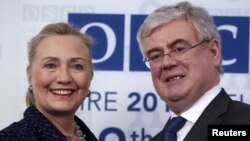LONDON —
U.S. Secretary of State Hillary Clinton sharply criticized Russia Thursday, saying it is trying to “re-Sovietize” Eastern Europe and Central Asia. Clinton spoke in Dublin at an event with civil society activists from the area, and at a meeting of the 57-member Organization for Security and Cooperation in Europe.
Meeting with the human rights activists, Secretary Clinton criticized Russian efforts to create a Eurasian Union, saying it is really an effort to re-assert Soviet-era controls on the region. She said the United States is working “to slow down or prevent it.”
She also took aim at new limits on human rights in several former-Soviet states. She singled out Russia for criminalizing foreign involvement in domestic human rights organizations, and said the United States is looking for new ways to support such groups.
Later, in her formal remarks at the OSCE meeting, she criticized Russian-backed efforts to limit the organization’s deliberations, slow its response to crises, and suspend existing agreements. She also cited efforts to block resolutions on digital age freedom, media freedom, freedom of assembly and association, and a measure on military transparency.
“These are not the way to progress in the 21st century," she said. "The United States remains committed to the goal of a Europe that is whole, free and at peace, and to the OSCE, whose principles are sound. We welcome any and all efforts to strengthen this organization, but that means empowering the organizations we already have to function free from interference - not curtailing them; and it means implementing the commitments we have made to one another and to our citizens, not undermining them.”
Speaking to the assembled delegates, including the Russian foreign minister and senior officials from other former Soviet states, Secretary Clinton also accused the Belarus government of systematically repressing human rights, and called October’s election in Ukraine “a step backwards for democracy.”
The secretary accused Tajikistan, Turkmenistan, Uzbekistan and Kazakhstan of restricting freedom of expression and religion. And in the Caucasus, she cited attacks on journalists, limits to judicial independence, and unfair elections.
She said anti-Semitism and discrimination against immigrants, Roma and homosexuals persist in Eastern Europe, and cited what she called “democratic backsliding” in Hungary and “challenges to constitutional processes” in Romania.
In the meeting with the activists, Secretary Clinton called it “distressing” that 20 years after the fall of the Soviet Union, “so many of the hoped-for indicators of progress are retreating.” She said the opportunities for human rights groups to operate are shrinking, and “governments are becoming much more aggressive in trying to stifle dissent, [and] prevent the free expression and exchange of views.”
Among the 11 activists at the meeting were representatives of groups from Russia, Turkmenistan, Belarus and Ukraine, which she called “one of our biggest disappointments.”
Although its official focus is European security, the OSCE has played a key role in promoting human rights since its founding during the Cold War in the 1970s, including the adoption of the Helsinki Final Act in 1975. Secretary Clinton said she sees “a growing concern for the future” of the organization, and what she called “the values it has always championed."
Meeting with the human rights activists, Secretary Clinton criticized Russian efforts to create a Eurasian Union, saying it is really an effort to re-assert Soviet-era controls on the region. She said the United States is working “to slow down or prevent it.”
She also took aim at new limits on human rights in several former-Soviet states. She singled out Russia for criminalizing foreign involvement in domestic human rights organizations, and said the United States is looking for new ways to support such groups.
Later, in her formal remarks at the OSCE meeting, she criticized Russian-backed efforts to limit the organization’s deliberations, slow its response to crises, and suspend existing agreements. She also cited efforts to block resolutions on digital age freedom, media freedom, freedom of assembly and association, and a measure on military transparency.
“These are not the way to progress in the 21st century," she said. "The United States remains committed to the goal of a Europe that is whole, free and at peace, and to the OSCE, whose principles are sound. We welcome any and all efforts to strengthen this organization, but that means empowering the organizations we already have to function free from interference - not curtailing them; and it means implementing the commitments we have made to one another and to our citizens, not undermining them.”
Speaking to the assembled delegates, including the Russian foreign minister and senior officials from other former Soviet states, Secretary Clinton also accused the Belarus government of systematically repressing human rights, and called October’s election in Ukraine “a step backwards for democracy.”
The secretary accused Tajikistan, Turkmenistan, Uzbekistan and Kazakhstan of restricting freedom of expression and religion. And in the Caucasus, she cited attacks on journalists, limits to judicial independence, and unfair elections.
She said anti-Semitism and discrimination against immigrants, Roma and homosexuals persist in Eastern Europe, and cited what she called “democratic backsliding” in Hungary and “challenges to constitutional processes” in Romania.
In the meeting with the activists, Secretary Clinton called it “distressing” that 20 years after the fall of the Soviet Union, “so many of the hoped-for indicators of progress are retreating.” She said the opportunities for human rights groups to operate are shrinking, and “governments are becoming much more aggressive in trying to stifle dissent, [and] prevent the free expression and exchange of views.”
Among the 11 activists at the meeting were representatives of groups from Russia, Turkmenistan, Belarus and Ukraine, which she called “one of our biggest disappointments.”
Although its official focus is European security, the OSCE has played a key role in promoting human rights since its founding during the Cold War in the 1970s, including the adoption of the Helsinki Final Act in 1975. Secretary Clinton said she sees “a growing concern for the future” of the organization, and what she called “the values it has always championed."










